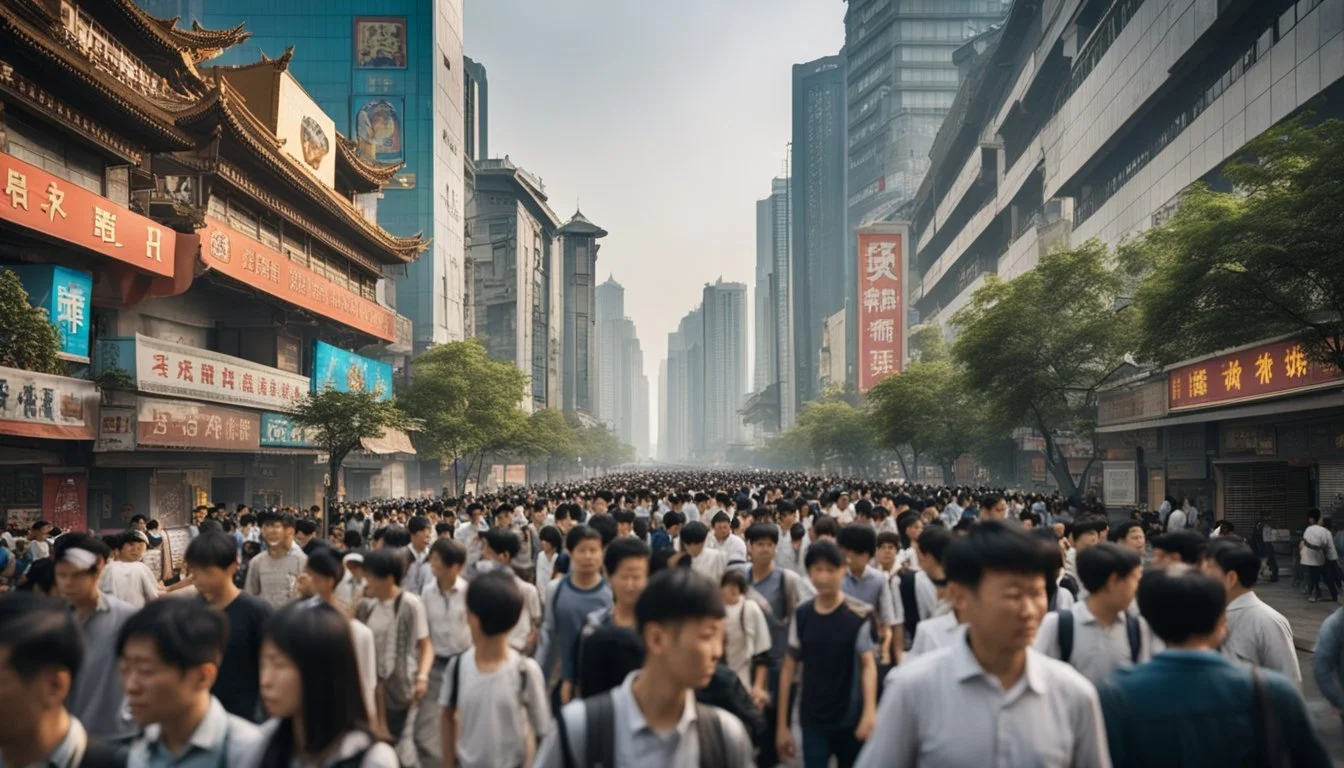Nanfu Wang: Exposing the Human Cost of China's Controversial Policies
Nanfu Wang has become a prominent voice in documenting the hidden impacts of China's one-child policy, which lasted from 1979 to 2015. Growing up in rural China, Wang experienced firsthand the intense social and governmental pressures that enforced the law. Her gripping documentary, "One Child Nation," reveals the stark human suffering imposed by the policy, shedding light on stories of forced sterilizations, abandoned children, and broken families.
Wang's work goes beyond personal narrative to confront broader truths about state control and its consequences. By interviewing a range of individuals from midwives to government officials, she provides a comprehensive look at how the policy reshaped society. Her insights not only document the past but also raise critical questions about the lingering effects on current and future generations.
The compelling storytelling in "One Child Nation" has sparked global conversations about reproductive rights, government overreach, and human resilience. Wang has played a crucial role in exposing the far-reaching ramifications and moral complexities of the one-child policy, ensuring that those affected are neither forgotten nor ignored.
Nanfu Wang: Profile
Nanfu Wang, an acclaimed documentarian, has skillfully used her own life experiences and education to shed light on critical social issues. Her journey from rural China to international recognition showcases her dedication and talent.
Early Life and Education
Nanfu Wang was born in 1985 in a rural village in Jiangxi Province, China. Growing up under China's strict "one-child" policy, Wang experienced firsthand the societal pressures and government mandates. Her parents managed to have two children, taking advantage of a legal exception applicable in certain rural areas.
Wang completed her bachelor's degree in English language and literature from Shanghai University. Later, she pursued further education in the United States, earning a Master's in Media Studies from Ohio University. This diverse educational background laid the foundation for her career in documentary filmmaking.
Career Beginnings
Initially, Wang's career began with reporting and freelance journalism. Her early work involved investigative pieces that explored social and political issues in China. Moving to the United States opened more opportunities for her to develop her skills.
Wang attended New York University (NYU) for her graduate studies in documentary filmmaking. At NYU, she honed her craft, learning storytelling techniques and technical skills. Her time there was pivotal, allowing her to create her first significant works and establish her vision as a filmmaker focused on humanizing complex political issues.
Notable Works and Awards
One of Wang's most notable works is "One Child Nation," a documentary that examines the human cost of China’s one-child policy. Co-directed with Jialing Zhang, the film combines personal stories and historical context to reveal the policy's profound impact on families. The documentary received wide acclaim and numerous awards, including the Grand Jury Prize at the Sundance Film Festival.
In addition to "One Child Nation," Wang directed "Hooligan Sparrow," which follows Chinese activist Ye Haiyan. This film, capturing the threats faced by activists in China, also garnered international accolades, including a nomination for the Independent Spirit Award for Best Documentary. Wang’s work continues to resonate globally, cementing her position as a crucial voice in documentary filmmaking.
Documentary Filmmaking Style
Nanfu Wang's documentary filmmaking style is characterized by her use of powerful narrative techniques, compelling cinematography and editing, and the integration of her own personal experiences.
Narrative Techniques
Nanfu Wang employs a mix of interviews and direct narration to weave her narrative. She often includes voices from various perspectives, such as experts, affected individuals, and government officials, giving a comprehensive view.
She skillfully blends personal stories with historical context. This approach allows viewers to grasp not just facts, but the emotional and human side of the subject matter.
By alternating between past and present, Wang creates a dynamic narrative flow. This method keeps the audience engaged and underscores the enduring impact of the policies she examines.
Cinematography and Editing
Wang's cinematography captures both intimate moments and broader societal contexts. Close-up shots of interviewees convey their emotions vividly, while wide shots depict the environments they inhabit.
Her use of archival footage alongside contemporary filming provides a visual contrast that highlights changes over time. This juxtaposition is crucial for illustrating the lasting effects of policies.
Editing plays a pivotal role. Her seamless transitions between interviews, personal reflections, and historical footage create a cohesive narrative, maintaining the viewer's attention and evoking strong emotional responses.
Use of Personal Experience
Wang's inclusion of her personal journey enriches her documentaries. She often narrates her own experiences and reflections, bridging the gap between filmmaker and subject matter.
Growing up under the one-child policy, Wang's insights provide authenticity and depth. Her personal stories resonate on a deeper level, illustrating the broader impact of the policies she critiques.
By sharing her evolution from belief in the policy to recognizing its flaws, Wang invites viewers to join her in questioning and understanding complex social issues. Her personal approach makes her films both informative and relatable.
Exposing China's One-Child Policy
Nanfu Wang's documentary, One Child Nation, sheds light on the intricate layers of China's one-child policy, delving into both its historical roots and its profound human impacts. The documentary reveals the far-reaching consequences of a policy that lasted from 1979 to 2015.
Historical Context
China's one-child policy, implemented in 1979, aimed to control the rapidly growing population. The government enforced strict regulations allowing most families to have only one child, although there were exceptions for rural families and certain minorities.
The policy was introduced as a solution to economic and social challenges posed by overpopulation. Authorities believed that controlling the birth rate would ease pressure on resources, healthcare, and education systems, thereby fostering sustainable development.
Human Stories Behind the Policy
One Child Nation brings forth personal testimonies that highlight the severe emotional and physical toll on families. Many women were forced to undergo sterilizations and abortions, often against their will. The film delves into the experiences of mothers who had to give up their second children or face harsh penalties.
Children affected by the policy often grew up in secrecy or were abandoned, leading to international adoptions. These personal stories, told through Wang’s poignant interviews, illustrate the human rights abuses and the deep scars left on Chinese society.
International Impact of the Work
Nanfu Wang’s One Child Nation has resonated globally, prompting international discussions on human rights and governmental control. The documentary has been acclaimed at various film festivals, raising awareness and sparking debates about the ethical implications of such population control policies.
The film also shed light on the broader implications for other nations considering similar measures. By exposing these stories on the world stage, Wang has opened up a dialogue that goes beyond China, urging the global community to reflect on the morality and consequences of restrictive policies on population control.
Challenges and Censorship
Nanfu Wang's journey to unveil the human cost of China's "one-child policy" presented significant hurdles, especially in navigating China's strict censorship and finding inventive ways to bring her work to a global audience.
Facing Governmental Resistance
Nanfu Wang encountered intense governmental resistance while making "One Child Nation." The Chinese government monitors and restricts media that could portray the country negatively. Wang faced constant scrutiny and potential danger to herself and her crew.
Authorities tried to prevent filming at sensitive locations. They also used intimidation tactics against interviewees, making it difficult to gather firsthand accounts. Despite being born in China, Wang's return as a filmmaker spotlighted her as a potential threat, adding pressure to her already challenging mission.
Necessity of Creative Distribution
Given the restrictive Chinese media environment, Wang had to devise creative strategies to distribute her documentary. Traditional Chinese media channels were not an option. Wang turned to international platforms, film festivals, and streaming services to bypass domestic censorship.
Collaborating with international partners, she ensured a broader reach. Online platforms played a crucial role, allowing global audiences to access the film despite Chinese censorship. These strategies not only amplified the film’s impact but also highlighted the importance of adaptability in dealing with censorship challenges.
Impact and Advocacy
The documentary "One Child Nation" by Nanfu Wang has profoundly influenced public perception and spurred advocacy for policy changes concerning China's infamous one-child policy. Both these aspects are crucial in understanding the broad implications of her work.
Influencing Public Opinion
"One Child Nation" has played a significant role in shaping global views on China's one-child policy. By presenting personal stories and firsthand accounts, Wang sheds light on the human rights abuses and societal impacts that resulted from this policy.
The film prompts viewers to consider the ethical dimensions of population control measures. Audiences are often left with a deeper understanding of the policy’s repercussions, both on a societal and personal level. This heightened awareness has led to more informed and empathetic discussions about similar issues globally.
Advocacy for Policy Changes
The awareness generated by "One Child Nation" has extended beyond public opinion, influencing policymakers and human rights organizations. Wang's documentary has been cited in advocacy efforts aimed at addressing and preventing coercive population control policies.
Human rights advocates use the film as a powerful tool to argue for legislative changes and to push for accountability. The stark illustrations of the policy’s effects have added weight to calls for reparations and support for affected families. Through these efforts, the documentary has contributed to tangible policy dialogues and actions.
Critical Reception and Analysis
"One Child Nation," directed by Nanfu Wang, has garnered significant attention from both academics and the film industry, lauded for its detailed exploration of China’s one-child policy and its impact.
Academic Perspectives
Scholars have praised the documentary for its rigorous investigation into the human consequences of China's one-child policy. It has sparked discussions across various fields including sociology, political science, and human rights studies.
Academic journals often cite the film when analyzing the social engineering aspects of the policy and its long-term effects on Chinese society. Educational institutions have integrated the documentary into curriculums, using it as a case study to examine government policies and their unintended repercussions. This reflects the film's effectiveness as a teaching tool, providing a firsthand look into a complex issue.
Film Industry Recognition
The film industry has acknowledged "One Child Nation" through multiple awards and nominations. Notably, the documentary won the Grand Jury Prize at the 2019 Sundance Film Festival, highlighting its critical acclaim.
Critics appreciate the film's emotional depth and the personal narrative woven by Wang, which adds a powerful layer to the broader political narrative. Reviews often emphasize the documentary's ability to evoke empathy by featuring personal stories of those directly affected. These accolades emphasize the documentary's impact and its successful execution as a compelling cinematic work.
Future Directions
Nanfu Wang continues to explore impactful stories and complex issues with her future projects. She aims to delve deeper into evolving themes that challenge societal norms and personal stories that resonate globally.
Upcoming Projects
Nanfu Wang’s upcoming projects promise to maintain her signature rigorous investigation and emotive storytelling. One of her anticipated works reportedly involves the exploration of environmental policies and their human impact. The specific areas she is likely to address could include the repercussions of pollution and industrial practices on rural communities.
Additionally, Wang may revisit the themes of family and government policies. Given her deep personal connection to these topics, the new films are expected to offer fresh perspectives and untold stories.
Evolving Themes and Subjects
Wang's future work is expected to evolve beyond the confines of policy critique to tackle broader societal issues. Themes such as migration, mental health, and technology's impact on human relationships might feature prominently. These subjects not only reflect current global concerns but also allow for a deeper examination of human resilience and adaptability.
By focusing on these evolving themes, Wang aims to challenge her audience and provoke thoughtful discussions. Her work will likely continue to highlight personal stories within larger socio-political contexts, maintaining her incisive and empathetic approach to documentary filmmaking.




